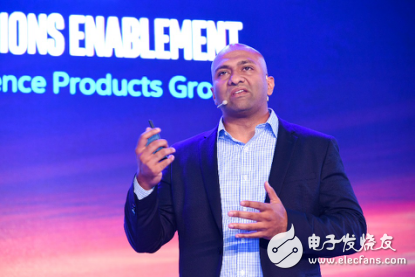August 24, Shanghai – Today, the 2017 Global Automotive AI Conference was held in Shanghai, and Fiaz Mohamed, Head of Business Development and Solution Deployment at Intel's Artificial Intelligence Products Division, delivered a keynote speech at the conference. Fiaz elaborated on the autopilot that gave birth to the passenger economy and its enormous economic and social value; shared how Intel supports autopilot through end-to-end artificial intelligence technology to cope with the data challenges it brings; Standardization and industrial collaboration are key to accelerating autonomous driving. Fiaz Mohamed, Head of Business Development and Solution Deployment, Intel Corporation's Artificial Intelligence Products Division Fiaz Mohamed said: "The way people travel in human society is undergoing profound changes, all of which stem from autonomous driving. It will also bring about economic and social reconstruction. Artificial intelligence technologies such as machine vision and deep learning are promoting automatic driving. The upgrade will promote the technical perfection and road test of self-driving cars. Intel is actively leading the technological innovation of autonomous driving, combining its own artificial intelligence advantages to promote the transformation of autonomous driving from vision to reality." Intel believes that the development of autonomous driving has spawned the arrival of a new era of "passenger economy." The “passenger economy†not only has huge economic potential, but also generates a new business model, and it will also generate huge social benefits. By 2050, Intel expects the "passenger economy" to reach $7 trillion. The “passenger economy†based on autonomous driving allows people to completely break away from the one-to-one relationship with the car and turn to travel-as-a-service, thus accelerating the rise of emerging service models and business models. In the keynote speech, Fiaz shared that as technology continues to advance, travel security is increasingly protected, especially as artificial intelligence is integrated into the stages of perception, integration and decision making in autonomous driving. Intel’s “Cargo Economy†report shows that in the passenger economy era from 2035 to 2045, autonomous vehicles will save 585,000 lives, and public safety costs associated with traffic accidents could save more than $234 billion. In the world's most congested cities, autonomous vehicles are expected to save 250 million hours of consumer commuting each year, providing time for new economic growth. When it comes to future cars and autonomous driving, each autonomous vehicle will generate about 4TB of data per day. As we move toward autonomous vehicles, data challenges will become more complex and require new ways to handle data in the car, in the network, and in the cloud. Mastering artificial intelligence in cars and data centers is critical to solving unmanned data challenges. Fiaz shares everything from cars to the cloud, and Intel's full-stack combination of artificial intelligence technologies will ensure that we respond to data challenges correctly. Intel's scalable in-vehicle computing platform uses artificial intelligence to meet the computational needs of in-vehicle sensing, convergence and decision-making through driving functions, environmental modeling and sensor fusion. In terms of connectivity, Intel technology will not only support data transmission, but will also support capture sensor data and real-time HD map updates to meet the needs of devices accessing the network for fast, low-latency computing and storage. In the cloud, artificial intelligence will continually practice a large amount of training to form new models that continuously improve the capabilities of the front end. As the level of driving automation increases, the car must have a clear understanding of the road ahead, evaluate the various possible scenarios, and take the best response. This requires the car to perform a large number of parallel and sequential calculations, processing millions of data points per second. Fiaz introduced the Intel® GOTM Autopilot development platform to provide a flexible architecture that includes a central processing unit (CPU), field programmable gate array (FPGA), and hardware acceleration technology for deep learning. This architecture combines unique, optimized parallelism and sequential processing capabilities to classify autonomous driving workloads as computational types that require efficient processing. By combining Intel® AtomTM processors, Intel® Xeon® processors, and Intel® Arria® 10 FPGAs, Intel offers a more energy-efficient, well-designed solution. Intel believes that unmanned technology will accelerate as the industry moves together to drive common platforms and technologies. This allows developers to quickly perform large-scale operations while enabling differentiated software solutions. Intel's confidence comes from the creation of the PC and data center industries. Prior to 1980, the computer industry was highly proprietary, serving researchers, large corporations and enthusiasts. Early PCs were not only the basis for computer design standardization, but also accelerated the evolution of technology, eventually achieving a 150-fold increase in 20 years. The data center is similar. Microcomputers that emerged after the mainframe increased flexibility and cost efficiency. But using PC technology makes the data center evolve rapidly and can handle the data brought by the Internet. IDC said that it produced 1.8ZB of data in 2011 and expects to generate more than 40ZB of data by 2020. Only through standardized solutions can we keep the development of the industry up to date. Back in the field of autonomous vehicles, the inspiration for years of industry collaboration in the PC, server industry, and computing markets is that common platform and industry collaboration can solve problems very effectively. Fiaz believes that this is the fastest way to drive autonomous driving forward. 24-hour long battery life, low power consumption and high wind power are better manifestations, whether it is shopping, traveling, going to school, commuting, watching dramas, or working, it will be your intimate partner. The fan blade is designed with soft silicone, which can be automatically stopped when touched, and the protection is more comprehensive. Outdoor Fan,Outdoor Mini Fan,Portable Small Fan,Outdoor Fan With Light Dongguan Yuhua Electronic Plastic Technology Co.,Ltd , https://www.yuhuaportablefan.com